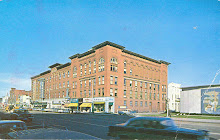 Once there was a young Master Mason who discovered a problem in the Lodge.
Once there was a young Master Mason who discovered a problem in the Lodge.What should he do? From a single problem, a terrible result might grow. The whole Lodge could suffer, and all of his Brothers might be affected. So he did the only thing he could think of. He took up the task, and the problem stopped.
Of course, now he was stuck. He couldn’t rest, because as soon as he did, the problem would start again.
So he did the task for quite some time. He was rather tired, and he felt a bit numb from the effort of doing the task without help, but he knew he was doing his duty. At last a Past Master happened to pass by.
“My Brother,” he said with a certain amount of sternness, “why are you doing what you are doing?”
“I am addressing a problem,” the Brother explained. “I saw the issue, so I did something about it.”
“Heroic!” the Past Master exclaimed. “You shall be rewarded! Meanwhile, keep doing it while I call the other Past Masters together.”
So the Past Master called a meeting of the all the Past Masters and they agreed that the Brother had heroically saved the Lodge. “And now,” the Past Master asked, “what shall we do about the problem?” “It seems to me,” one of the other Past Masters replied, “that private enterprise has already found an admirable solution to the problem. The Brother has undertaken the task, and the problem has stopped. You might describe it as voluntary self-regulation. There is no need for expensive action.”
So the Past Masters voted to award the Brother a Certificate of Appreciation, which the Past Master was delighted to be able to present to him the next day. “Thank you,” the Brother said politely, “but I still have to keep doing this to keep the problem under control.” “And we appreciate that,” the Past Master replied. “I may confidently speak for the whole group of Past Masters in saying that your heroic action is universally admired.”
So the Brother continued laboring for a few more days.
It was not long, however, before another problem appeared in the Lodge, connected to the first. “What shall we do?” the Past Master asked the other Past Masters. “There is another problem.” “As private enterprise has so admirably solved the previous problem,” one of the Past Masters responded, “the solution to this new issue is obvious. We need only persuade another heroic Brother to deal with it.”
So they went into the Lodge meeting and found another Brother who, after much persuasion, was willing to deal with the problem.
It was, however, only a few days later that two more issues surfaced. This time it was much harder to persuade Brothers to step forward and help; and when, a week later, half a dozen more problems appeared, no volunteers were to be found.
“What shall we do?” the Past Master asked the other Past Masters. “Private enterprise seems no longer to be adequate. We may have to fix the problem itself this time.” “Nonsense,” said one of the Past Masters. “The solution that worked before will work again. We must simply force private enterprise into action.”
So the Past Masters visited the Lodge and guilted a number of young Master Masons into dealing with the problem.
But the Lodge, which was old and poorly maintained, continued to spring new problems here and there, so that it was all the Past Masters could do to find more young Master Masons to deal with the issues. At last the Past Masters compelled every young Master Mason in the Lodge to deal with an issue – without addressing the larger problem. All Lodge activity came to a halt, as it is well known that young Master Masons are very willing to participate, which the Lodge depended upon at that time.
“What shall we do?” the Past Master asked the other Past Masters. “We have run out of heroic young Master Masons. At this rate, we may have to deal with the problems ourselves.”
“That would be moderately inconvenient,” said one of the Past Masters.
So the Past Masters decided to address the problem by ignoring it – for if they ignored it, it would go away. Several years have passed and the young Master Masons have moved away. The old Past Masters can still be found, in their crumbling Lodge, still ignoring the problem. And if you go by the Lodge right now, and look into the Lodge room, you will see a number of old Past Masters very busy complaining but not doing anything about their problem. It is lucky for them most people have mistaken the them for a group of crotchety old men talking about past glory, which has allowed them to continue their labor uninterrupted.









